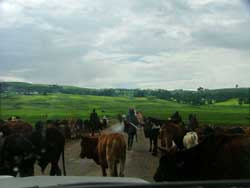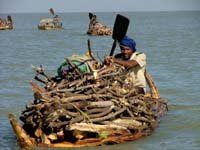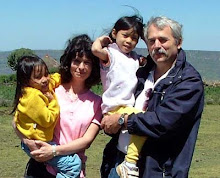
We are all fine and there is a degree of peace for the moment. We don't feel under any particular danger for the time being but will need to keep a breast of situations as they develop as things can happen quickly.
Just hours before the trouble broke out a week ago, through the university students, we were able to launch our pilot project for street kids. They were able to get some of the kids off the street just before the shooting broke out. It was a very dangerous place to be on the street and the police were chasing down anyone they suspected of throwing stones and were arresting them or in some cases shooting them. Our own language helper narrowly escaped as did the core group that is meeting at our place Saturday nights. They indicated they were running for their lives as police came on campus and were shooting wildly. This was followed up by several nights where the police would come at night with lists of students and take them from their beds. Most of the students have since been released as well as most of the thousands that they took prisoner from the surrounding areas of town. Most of the opposition leaders as well as many newspaper editors have been arrested and are being charged with treason. If convicted they could face the death penalty. Last year I taught computers to the son of one of the chief opposition leaders (the current mayor of Addis Ababa). Pray that peace and sensible minds would prevail on all sides and that it would diffuse the current powder keg. Troops have also been amassing on the border of Eritrea. We live on the main road to the north and for two weeks convoys of troops and equipment were heading for the border. It is estimated that there are 300,000 troops now amassed on the border.
In spite of all the unrest we are continuing to be encouraged by the development of the urban ministries program. When we were doing some survey work last year we discovered there was a university here and that there was a large Christian Fellowship in the university. Immediately we sensed that the key to tackling the overwhelming needs facing this area may be to mobilize the university students. God has given us a core group of key leaders that meet weekly at our place for prayer and planning. Before we even connected with them they were already forming plans on what they could do. We thought it was going to take years to develop a relationship with the students to the extent that they would be interested in doing something concrete about the needs in Bahir Dar. It happened almost over night and the pilot project, though in it's infant stages, is up and running, for which we are very thankful
Just hours before the trouble broke out a week ago, through the university students, we were able to launch our pilot project for street kids. They were able to get some of the kids off the street just before the shooting broke out. It was a very dangerous place to be on the street and the police were chasing down anyone they suspected of throwing stones and were arresting them or in some cases shooting them. Our own language helper narrowly escaped as did the core group that is meeting at our place Saturday nights. They indicated they were running for their lives as police came on campus and were shooting wildly. This was followed up by several nights where the police would come at night with lists of students and take them from their beds. Most of the students have since been released as well as most of the thousands that they took prisoner from the surrounding areas of town. Most of the opposition leaders as well as many newspaper editors have been arrested and are being charged with treason. If convicted they could face the death penalty. Last year I taught computers to the son of one of the chief opposition leaders (the current mayor of Addis Ababa). Pray that peace and sensible minds would prevail on all sides and that it would diffuse the current powder keg. Troops have also been amassing on the border of Eritrea. We live on the main road to the north and for two weeks convoys of troops and equipment were heading for the border. It is estimated that there are 300,000 troops now amassed on the border.
In spite of all the unrest we are continuing to be encouraged by the development of the urban ministries program. When we were doing some survey work last year we discovered there was a university here and that there was a large Christian Fellowship in the university. Immediately we sensed that the key to tackling the overwhelming needs facing this area may be to mobilize the university students. God has given us a core group of key leaders that meet weekly at our place for prayer and planning. Before we even connected with them they were already forming plans on what they could do. We thought it was going to take years to develop a relationship with the students to the extent that they would be interested in doing something concrete about the needs in Bahir Dar. It happened almost over night and the pilot project, though in it's infant stages, is up and running, for which we are very thankful








 I woke up in the middle of the night to the sound of a wild boar outside our tent. Then I realized the sound was inside the tent. I was disoriented trying to figure out where I was. When I finally got my bearings I realized I was on a trip to the south of Ethiopia with my Grade 9 class and the wild boar was the erratic snoring of one of the students. (towards the end of the trip they insisted I have a room of my own due to my own snoring).
I woke up in the middle of the night to the sound of a wild boar outside our tent. Then I realized the sound was inside the tent. I was disoriented trying to figure out where I was. When I finally got my bearings I realized I was on a trip to the south of Ethiopia with my Grade 9 class and the wild boar was the erratic snoring of one of the students. (towards the end of the trip they insisted I have a room of my own due to my own snoring).




















